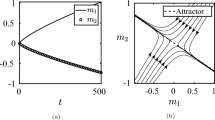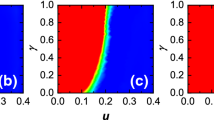Abstract
We reconsider the well-studied Selfish Routing game with affine latency functions. The Price of Anarchy for this class of games takes maximum value 4/3; this maximum is attained already for a simple network of two parallel links, known as Pigou’s network. We improve upon the value 4/3 by means of Coordination Mechanisms.
We increase the latency functions of the edges in the network, i.e., if ℓ e (x) is the latency function of an edge e, we replace it by \(\hat{\ell}_{e}(x)\) with \(\ell_{e}(x) \le \hat{\ell}_{e}(x)\) for all x. Then an adversary fixes a demand rate as input. The engineered Price of Anarchy of the mechanism is defined as the worst-case ratio of the Nash social cost in the modified network over the optimal social cost in the original network. Formally, if \(\hat{C}_{N} (r)\) denotes the cost of the worst Nash flow in the modified network for rate r and C opt (r) denotes the cost of the optimal flow in the original network for the same rate then
We first exhibit a simple coordination mechanism that achieves for any network of parallel links an engineered Price of Anarchy strictly less than 4/3. For the case of two parallel links our basic mechanism gives 5/4=1.25. Then, for the case of two parallel links, we describe an optimal mechanism; its engineered Price of Anarchy lies between 1.191 and 1.192.


Similar content being viewed by others
Notes
This assumes continuity and monotonicity of the latency functions. For non-continuous functions, see the discussion later in this section.
Technically, we consider symmetric coordination mechanisms in this work, as defined in [8] i.e., the latency modifications affect the users in a symmetric fashion.
One can interpret the difference \(\hat {\ell }_{e}-\ell_{e}\) as a flow-dependent toll imposed on the edge e.
See Sect. 5 for a formal definition.
See [4] for a definition of regular functions.
The lower bound that we provide in Sect. 5 holds for all deterministic coordination mechanisms that use non-decreasing modified latencies, with respect to both notions of equilibrium described in the previous paragraph.
It is important to observe that although the Nash flow is equal to the optimum flow, its cost with respect to the marginal cost function can be twice as large as its cost with respect to the original cost function. For Pigou’s network, the marginal costs are \(\hat {\ell }_{1}(x) = 2x\) and \(\hat {\ell }_{2}(x) = 1\). The cost of a Nash flow of rate r with r≤1/2 is 2r 2 with respect to marginal costs; the cost of the same flow with respect to the original cost functions is r 2.
It is not hard to see that, similarly to the case where the demand is known, using global flow information (at least for the case of parallel links) can lead to mechanisms with ePoA=1. We would like to thank Nicolás Stier Moses for making us emphasizing that distinction.
In a Nash flow all used links have the same latency. Thus, if j links are used at rate r and \(f_{i}^{N}\) is the flow on the i-th link, then \(a_{1} f_{1}^{N} + b_{1} = \cdots = a_{j} f_{j}^{N} + b_{j} \le b_{j+1}\) and \(r = f_{1}^{N} + \cdots + f_{j}^{N}\). The values for r j and \(f_{i}^{N}\) follow from this. Similarly, in an optimal flow all used links have the same marginal costs.
In Pigou’s network we have ℓ 1(x)=x and ℓ 2(x)=1. Thus λ 2=∞. The modified cost functions are \(\hat {\ell }_{2}(x) = \ell_{2}(x)\) and \(\hat {\ell }_{1}(x) = x\) for x≤r 2/2=1/2 and \(\hat {\ell }_{1}(x) = \infty\) for x>1/2. The Nash flow with respect to the modified cost function is identical to the optimum flow in the original network and \(\hat {C}_{N}(f^{*}) = C(f^{*})\). Thus ePoA=1 for Pigou’s network.
The optimal choice for x 1 and r ∗ is such that both terms are equal and as small as possible. We were unable to solve the resulting system explicitly. We will prove in the next section that the mechanism defined by these optimal choices of the parameters x 1 and r ∗ is optimal.
It remains open whether similar arguments can be applied for showing the lower bound for non-monotone mechanisms with respect to User Equilibria.
References
Angel, E., Bampis, E., Pascual, F.: Truthful algorithms for scheduling selfish tasks on parallel machines. Theor. Comput. Sci. 369(1–3), 157–168 (2006)
Angel, E., Bampis, E., Pascual, F., Tchetgnia, A.-A.: On truthfulness and approximation for scheduling selfish tasks. J. Sched. 12(5), 437–445 (2009)
Azar, Y., Jain, K., Mirrokni, V.S.: (Almost) optimal coordination mechanisms for unrelated machine scheduling. In: SODA, pp. 323–332 (2008)
Bernstein, D., Smith, T.E.: Equilibria for networks with lower semicontinuous costs: with an application to congestion pricing. Transp. Sci. 28(3), 221–235 (1994)
Bonifaci, V., Salek, M., Schäfer, G.: On the efficiency of restricted tolls in network routing games. In: SAGT, pp. 302–313 (2011)
Caragiannis, I.: Efficient coordination mechanisms for unrelated machine scheduling. In: SODA, pp. 815–824 (2009)
Christodoulou, G., Gourvès, L., Pascual, F.: Scheduling selfish tasks: about the performance of truthful algorithms. In: COCOON, pp. 187–197 (2007)
Christodoulou, G., Koutsoupias, E., Nanavati, A.: Coordination mechanisms. Theor. Comput. Sci. 410(36), 3327–3336 (2009)
Christodoulou, G., Mehlhorn, K., Pyrga, E.: Improving the price of anarchy for selfish routing via coordination mechanisms. In: ESA, pp. 119–130 (2011)
Cole, R., Dodis, Y., Roughgarden, T.: Pricing network edges for heterogeneous selfish users. In: STOC, pp. 521–530 (2003)
Cole, R., Dodis, Y., Roughgarden, T.: How much can taxes help selfish routing? J. Comput. Syst. Sci. 72(3), 444–467 (2006)
Cole, R., Correa, J.R., Gkatzelis, V., Mirrokni, V., Olver, N.: Inner product spaces for MinSum coordination mechanisms. In: STOC (2011)
Correa, J.R., Schulz, A.S., Stier-Moses, N.E.: A geometric approach to the price of anarchy in nonatomic congestion games. Games Econ. Behav. 64, 457–469 (2008)
Dafermos, S.: An extended traffic assignment model with applications to two-way traffic. Transp. Sci. 5, 366–389 (1971)
Dafermos, S.C., Sparrow, F.T.: The traffic assignment problem for a general network. J. Res. Natl. Bur. Stand. B, Math. Sci. 73B(2), 91–118 (1969)
de Palma, A., Nesterov, Y.: Optimization formulations and static equilibrium in congested transportation networks. CORE Discussion Paper 9861, Université Catholique de Louvain, Louvain-la-Neuve, 12–17, 1998
Fleischer, L.: Linear tolls suffice: new bounds and algorithms for tolls in single source networks. Theor. Comput. Sci. 348(2–3), 217–225 (2005)
Fleischer, L., Jain, K., Mahdian, M.: Tolls for heterogeneous selfish users in multicommodity networks and generalized congestion games. In: FOCS, pp. 277–285 (2004)
Immorlica, N., Li, L., Mirrokni, V.S., Schulz, A.: Coordination mechanisms for selfish scheduling. In: WINE, pp. 55–69 (2005)
Karakostas, G., Kolliopoulos, S.G.: Edge pricing of multicommodity networks for heterogeneous selfish users. In: FOCS, pp. 268–276 (2004)
Karakostas, G., Kolliopoulos, S.G.: The efficiency of optimal taxes. In: CAAN, pp. 3–12 (2004)
Kollias, K.: Non-preemptive coordination mechanisms for identical machine scheduling games. In: SIROCCO, pp. 197–208 (2008)
Koutsoupias, E., Papadimitriou, C.: Worst-case equilibria. Comput. Sci. Rev. 3(2), 65–69 (2009)
Marcotte, P., Patriksson, M.: Traffic equilibrium. In: Transportation. Handbooks in Operations Research and Management Science, vol. 14, pp. 623–713. North-Holland, Amsterdam (2007). Chap. 10
Nisan, N., Roughgarden, T., Tardos, E., Vazirani, V.V.: Algorithmic Game Theory. Cambridge University Press, Cambridge (2007)
Patriksson, M.: The Traffic Assignment Problem: Models and Methods. V.S.P. Intl Science, Leiden (1994)
Roughgarden, T.: Designing networks for selfish users is hard. In: FOCS (2001)
Roughgarden, T., Tardos, É.: How bad is selfish routing? J. ACM 49, 236–259 (2002)
Wardrop, J.G.: Some theoretical aspects of road traffic research. In: Proceedings of the Institute of Civil Engineers, Part II, vol. 1, pp. 325–378 (1952)
Acknowledgements
We would like to thank Elias Koutsoupias, Spyros Angelopoulos and Nicolás Stier Moses for many fruitful discussions.
Author information
Authors and Affiliations
Corresponding author
Rights and permissions
About this article
Cite this article
Christodoulou, G., Mehlhorn, K. & Pyrga, E. Improving the Price of Anarchy for Selfish Routing via Coordination Mechanisms. Algorithmica 69, 619–640 (2014). https://doi.org/10.1007/s00453-013-9753-8
Received:
Accepted:
Published:
Issue Date:
DOI: https://doi.org/10.1007/s00453-013-9753-8




